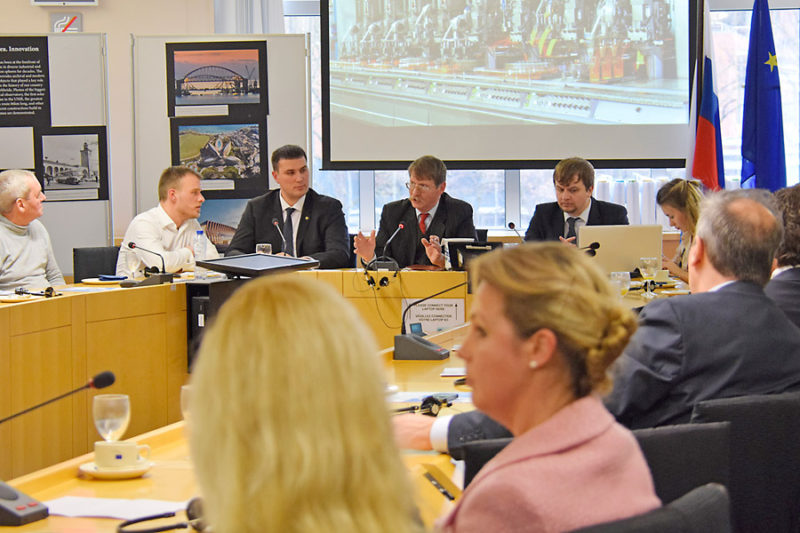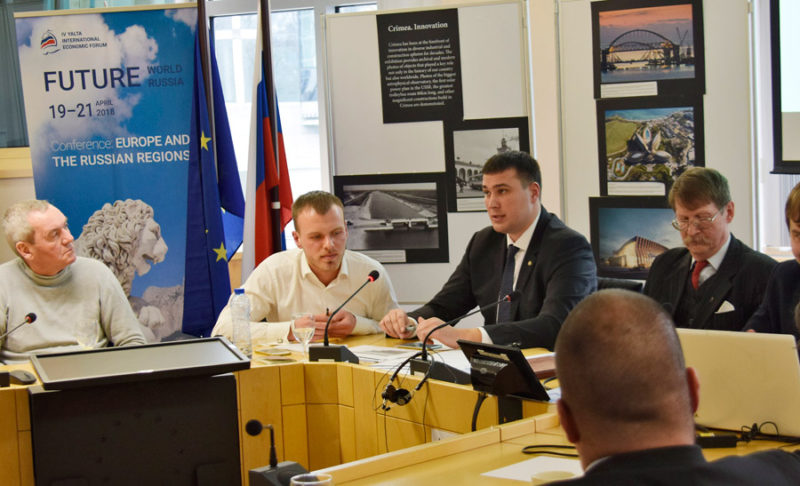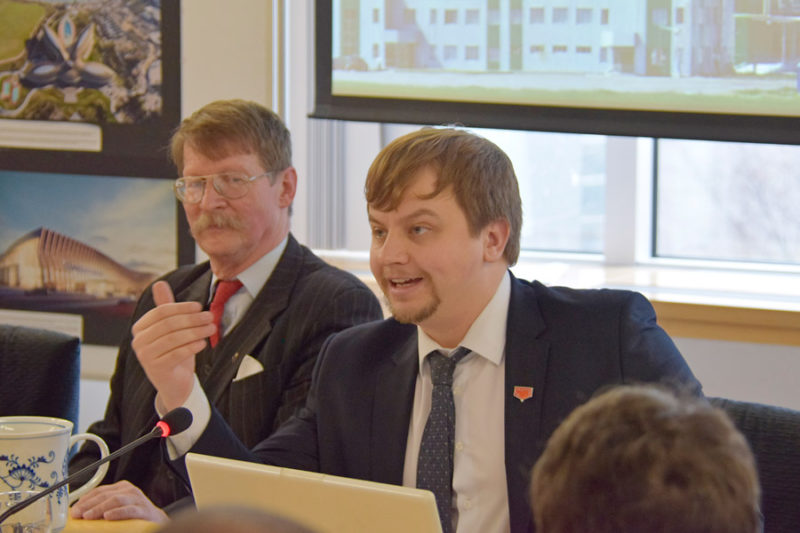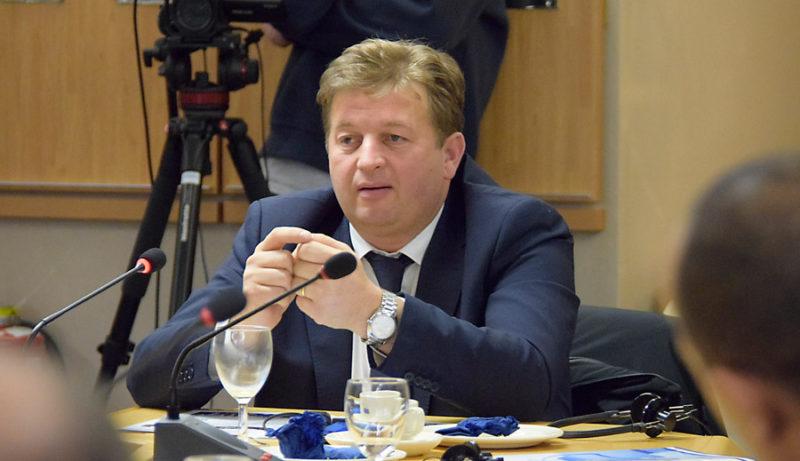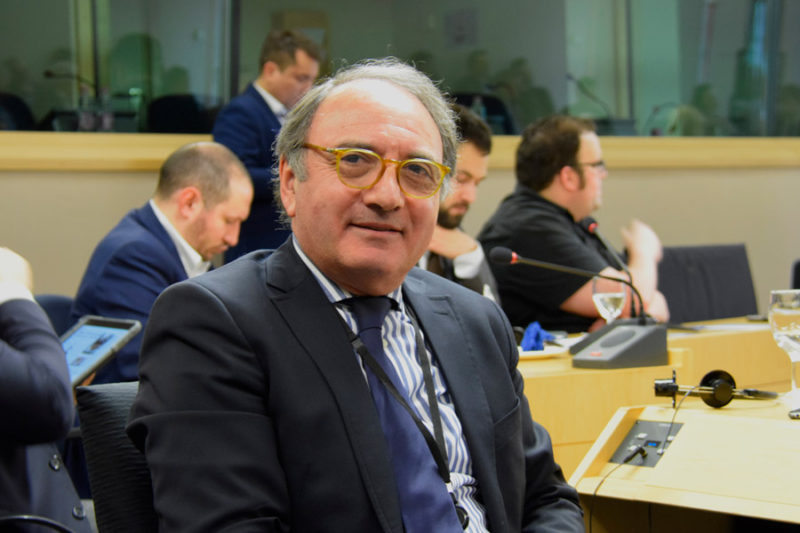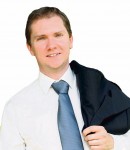 Conference in European Parliament, Brussels, January 23rd, against EU sanctions targeting Russia. Photo: FWM
Conference in European Parliament, Brussels, January 23rd, against EU sanctions targeting Russia. Photo: FWM
A Crimean coup in the European Parliament
A conference against EU-imposed sanctions on Russia was held inside the EU Parliament in Brussels on January 23rd. Parliamentarians from different political camps joined forces in a pursuit of a de-escalation of the tensions between Russia and the EU and to promote international cooperation. What came as a surprise to many was that a delegation from Crimea also arrived to participate in the debate.
Published: January 25, 2018, 12:45 am
Within the EU there is opposition against the sanctions that the Union had imposed on Russia in the spring of 2014 because of “the illegal annexation of Crimea and deliberate destabilisation of a neighbouring sovereign country”. Members of the European Parliament and other lawmakers gathered on January 23rd to express their criticism against the sanctions and discuss how cooperation could be developed.
The meeting was arranged by the Czech MEP Jaromír Kohlíček, who represents the Czech Communist party and is a member of the Group of the European United Left – Nordic Green Left. He emphasized that Russia is and has always been an important part of Europe, and that the way forward for Europe is not through the splitting of our continent by means of sanctions and bullying one of its states.
What came as a surprise to many was the participation of a delegation from Crimea. It might also have been the very first time that the prime minister of Crimea, Sergey Aksionov, appeared – at least virtually – in the same halls where the majority of the European deputies frequently voted for sanctions against the Russian Federation – also because of Crimea. Aksionov was listed on the EU sanction list on March 17, 2014. The official reason: “Aksyonov was elected ‘Prime Minister of Crimea’ in the Crimean Verkhovna Rada on February 27th, 2014, in the presence of pro-Russian gunmen. His ‘election’ was decreed unconstitutional by Oleksandr Turchynov on 1 March. He actively lobbied for the ‘referendum’ of 16 March 2014.”
In a pre-recorded speech, Aksionov said: “Crimea has been part of Ukraine for almost a quarter of a century. This was a time of regress, decay and discrimination. The riches of our land have been pillaged by Ukrainian oligarchs.” The Crimean prime minister describes the choice of 2014 for many citizens of the peninsula: “Ukraine: blood and war or Russia: peace and freedom.” In his speech he invited the deputies of the conference to visit Crimea: “Come, observe and make your own conclusions.”
Present in the conference hall were Aleksei Vorobev and Aleksandr Vedrussov, Russian political analysts. They told the parliamentarians that the sanctions actually helped Russia in the sense that it had to diversify its economy and markets. Today a lot of trade and cooperation is towards Asia, and although the EU is trying to degrade the Russian economy, the growth rate has recovered and showed strong figures during the year 2017.
Russia has also had to relay more on internal suppliers and point out for example all the new models of civilian aircraft being produced and taken into service. Also the Czech MEP Kohlíček touched on the subject and desribed several areas, especially within technical products, where components earlier delivered from Czechia now are manufactured domestically by the Russians themselves.
Vorobev gave several examples of how Crimea has benefited from the reunification with Russia. There is for example a famous astrophysical observatory, with the Shayn telescope probably being the best known for its many scientific breakthroughs, but the Ukrainian authorities cut the funding to this site, trying to shut it down completely several times. Under the new administration, new investments are being made and the telescopes are being upgraded.
The Russian representatives also explained that because of the re-orientation to the East, Siberia has become a rapidly evolving region, and among other things the port of Vladivostok is being expanded to meet the greater demand. The expanded economic cooperation with China has led to investments to facilitate the Arctic trade route with the help of new icebreakers. Vorobev told the conference that while the ordinary route from China to Amsterdam via the Suez Canal takes 48 days, the same destination can be reached in 35 days using the Arctic route.
At the same time, he underscored that the deepened contacts with the Far East can also be beneficial to Europe, and that we all should work for an open market that everybody can benefit from.
Filip Dewinter, parliamentarian in Belgium for the patriotic Flemish party Vlaams Belang, pointed out that the Belgian economy was suffering under the sanctions. This concerns farming, especially exports of vegetables, but also arms, for which Belgium is famous.
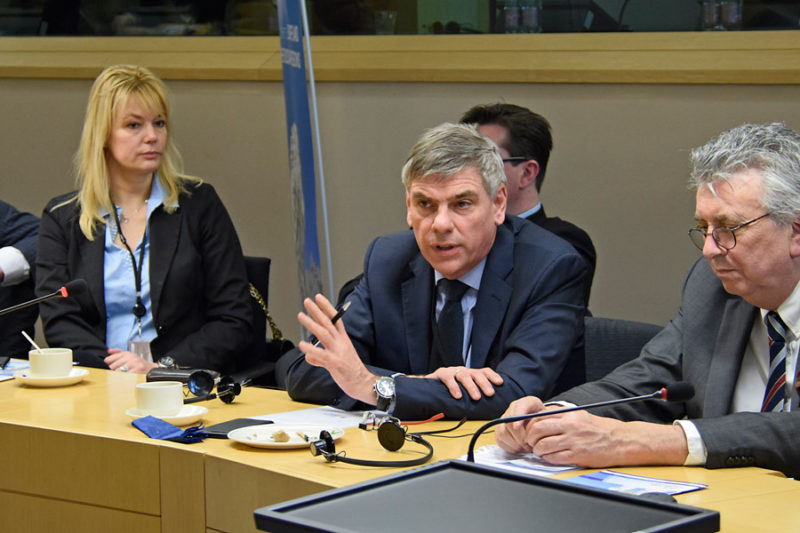
Filip Dewinter, Member of the Flemish Parliament, and Anke Van Dermeersch, Senator of Belgium, both of the Flemish Vlaams Belang. Photo: FWM
Dewinter went on to widen the scope to international relations and the geopolitical scene. He took the war in Syria as an example, and told the conference that he had had the privilege to meet with the country’s President Bashar Assad twice and discuss the situation. It is clear, he said, that Russia plays an important role in defeating terrorism and creating conditions for peace in the region.
Several speakers were of the opinion that the only one benefiting from the sanctions was the United States, which has increased its exports during the last few years, while Europe’s exports have dwindled. Some called the member states of the European Union vassals to USA, without the possibility of formulating their own independent foreign policy.
Roberto Ciambetti, the President of the Regional Council of Veneto in northern Italy, said that during the referendum in Crimea he had told a journalist: Go there! See for yourself what the people of Crimea want.
The fact that a delegation from Crimea could attend a meeting inside the EU parliament has been called a virtual coup by some.
– I actually believed that the security guards would burst in and terminate the conference, but everything went smoothly and I see that there are a lot of decent and intelligent people here, Vorobev told our reporter.
As yet another way to protest the sanctions, the Crimean representatives brought Crimean tea as a gift for other participants, a product that is also banned under the EU sanctions. In addition they invited the guests of the conference to visit the Yalta International Economic Forum – one of the most important events in the Russian Federation this year. Each year the Forum is attended by high-level Russian government officials, international experts, influential international and Russian businesspeople and economists, representatives of major business organisations and other opinion leaders.
The conference united politicians from different camps and with what appears to be conflicting ideologies. Jaromír Kohlíček explained to our reporter that it was important that different opinions on other topics should not stand in the way of cooperation on important issues like the prevention of Europe being divided, a situation in which we would all be losers.
Similarly to other participants, he expressed the view that it seemed to be more important for some politicians to ostracize and isolate, than to achieve actual political results. That the main thing for them was not what you believed, but who you talked to.
Filip Dewinter told us that Vlaams Belang stood united behind the critique against sanctions, but that there were different opinions about the Crimean issue. His main impression was however that it should be considered as an internal Russian issue.
Kohlíček, being a representative for Czechia, reminded the participants of the strong cultural bonds with the East. He mentioned among other things the two Greek brothers and missionaries Cyril and Methodius, who already in the 9th century constructed the Cyrillic alphabet during their stay in the Czech lands, and spread the alphabet to the Slavic peoples. Even if Czechia isn’t using Cyrillic writing today, many of the countries of Eastern Europe do, including Russia.
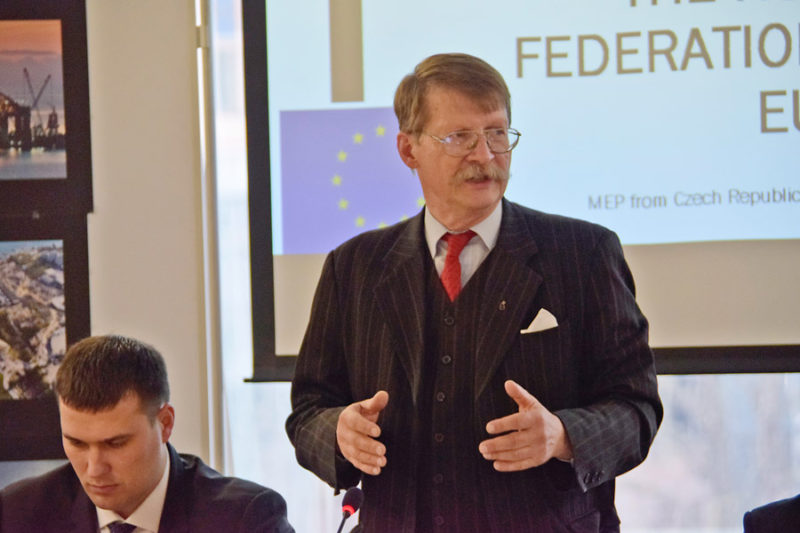
Jaromír Kohlíček, Czech member of the European Parliament and member of the EU Group of the European United Left – Nordic Green Left. Photo: FWM
When we ask about what he thought the response would be to the conference, he said he was used to being criticised:
– ”What kind of Czech communist are you anyway?”, they ask. “You don’t drink beer, you have four kids and you don’t mind talking to people on the extreme right.”
He smiled and took a sip out of his 1,5 litre mug filled with green tea.
All rights reserved. You have permission to quote freely from the articles provided that the source (www.freewestmedia.com) is given. Photos may not be used without our consent.
Consider donating to support our work
Help us to produce more articles like this. FreeWestMedia is depending on donations from our readers to keep going. With your help, we expose the mainstream fake news agenda.
Keep your language polite. Readers from many different countries visit and contribute to Free West Media and we must therefore obey the rules in, for example, Germany. Illegal content will be deleted.
If you have been approved to post comments without preview from FWM, you are responsible for violations of any law. This means that FWM may be forced to cooperate with authorities in a possible crime investigation.
If your comments are subject to preview by FWM, please be patient. We continually review comments but depending on the time of day it can take up to several hours before your comment is reviewed.
We reserve the right to delete comments that are offensive, contain slander or foul language, or are irrelevant to the discussion.

NOAA Predicts Zero Sunspots for Almost the Whole 2030s
CLIMATEThe United States' government scientific organization, the National Oceanic and Atmospheric Administration (NOAA), predicts zero sunspots from 2031 to 2040. This is an extreme situation that has not occurred in as long as humanity has been counting sunspots, and it leads us into uncharted territory in terms of our solar system. However, this prediction aligns with the warnings of the world-renowned solar researcher Valentina Zharkova for many years, who indicated in 2019 various signs of this catastrophic phenomenon, including the extreme hailstorms we have seen in Europe and the world this summer. The forecast and various observations this year give cause for very significant concern. In this unique analysis, Free West Media explains why.

European Nationalist Parties Forge Cooperation Ahead of EU Elections
EUROPEAN ELECTIONSOn Saturday, August 26, representatives of six European nationalist parties gathered in Budapest. The meeting was initiated by the Hungarian party Mi Hazánk and took place in the national parliament. Representatives of the parties signed a joint declaration that not only reaffirms the parties' friendship but also their unity on a range of complex political issues. A surprisingly clear and radical manifesto was established. The hope is that this cooperation will lead to success in the EU elections and eventually result in the formation of a group in the European Parliament. For Swedish nationalism, this meeting marks a success as Sweden, for the first time, has a party represented in a leading nationalist cooperation in Europe. Free West Media was present at this historic event.

Turkey Believes Sweden Hasn’t Done Enough
Sweden will have to wait a bit longer for NATO membership, according to Turkey's Justice Minister Jilmaz Tunc. First, Sweden must extradite the "terrorists" Turkey wants and stop the desecration of the Quran.

Swedish Weapon Takes Down Russia’s Best Attack Helicopter
The Russian attack helicopter Ka-52 is considered one of the world's best and has struck fear in Ukraine, where it has hunted down tanks and other armored vehicles, often beyond the range of many light anti-aircraft systems. However, it has met its match in the Swedish air defense missile system RBS 70, which has quickly led to significant losses for the Russian helicopter forces.

Strong Confidence in German AfD
Alternative for Germany (AfD) held a party conference on July 29-30 to select candidates for the upcoming EU election next year. EU Parliament member Maximilian Krah, belonging to the party's more radical, ethnonationalist faction, was appointed as the top candidate. The party's two spokespersons delivered powerful speeches criticizing the EU's failed migration policy and trade sanctions that isolate Europe and Germany from the rest of the world. They argued that it's time for the EU to return a significant portion of its power to national parliaments. However, they have dropped the demand for Germany to exit the EU.

The Establishment Wants to Ban Germany’s Second Largest Party – for the Sake of Democracy
The rising popularity of AfD has raised strong concerns within the establishment. Despite lies and demonization in the media and isolation from the overall political establishment, the party continues to grow. Certain representatives of the party are accused of becoming increasingly "extreme," and in an unusual move, the influential weekly newspaper Der Spiegel demanded that AfD be "banned."

Dutch FvD break through the media blockade
What is happening in the Netherlands? It is often difficult to follow events in other countries, especially when distorted by system media. We give Forum for Democracy (FvD) the opportunity to speak out on the political situation in the Netherlands and the staunch resistance they face in trying to save the country.

The Ursula von der Leyen Affair
After a criminal complaint in Belgium against the President of the European Commission, the so-called SMS-case, now takes a new turn. The judge responsible for the investigation will likely gain access to the secret messages exchanged between Ursula von der Leyen and Albert Bourla, CEO of Pfizer, at least if they haven't been deleted.

Publisher of Unique Literature Worldwide Blocked by International Distributor
Arktos has distinguished itself by publishing groundbreaking philosophers and social critics. Now, the publisher's international distributor has abruptly terminated the cooperation, and more than 400 already printed titles cannot reach their audience. There is strong evidence that the distributor has been under pressure, something that has also happened in Sweden. We have spoken with Arktos founder Daniel Friberg about the ongoing struggle for freedom of speech in a shrinking cultural corridor.

Care prompts bishops to criticize transgender ideology
The Catholic bishops of the Scandinavian countries presented an open five-page letter criticizing transgender ideology on March 21, just before Easter. The document primarily expresses care and advice and was read aloud in Catholic churches in Sweden, Norway, Finland, Denmark, and Iceland. Cardinal Anders Arborelius, Bishop of Stockholm, is one of the signatories of the document.





